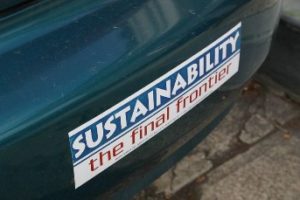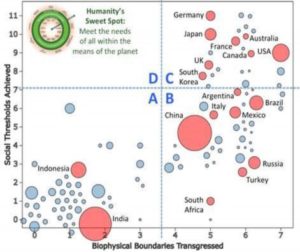Climate Justice: Asymmetrical Responsibilities – Coco Hoskin-Murray

Recently, during a speech to the QRC (Queensland Resources Council), the Prime Minister Scott Morrison claimed to be looking into “serious mechanisms” which could “successfully outlaw” some so called “indulgent and selfish practices that threaten the livelihoods of fellow Australians”. These “indulgent and selfish practices” which he refers to are environmental or climate related boycott campaigns. Such campaigns seek to lessen demand for businesses which are either directly or indirectly involved in environmentally damaging practices. This statement follows on from Scott Morrison’s absence at the UN climate Summit in New York this year and his subsequent defence that Australia is “taking real action on climate change”.
From the perspective of economic orthodoxy, the intervention which Mr Morrison suggests places the desire of consumers for environmentally conscious products and processes as a sign of market failure. This seems a dangerous conception under current circumstances. It is perhaps no surprise that the current government subscribes to such, as well as to short and narrow sightedness. What Mr Morrison seems to be missing in his intent to protect livelihoods, however, is that climate change will (and is) affect(ing) lives and livelihoods everywhere.
A key point of the 2018 Global Warming of 1.5 degC Report is that “we are already seeing the consequences of 1 deg C warming through more extreme weather, rising sea levels and diminishing Arctic sea ice, among some other changes”. If we do not curb our emissions by 2030, changes are irreversible. The fact that the International Panel for Climate Change (IPCC) has demonstrated foreseeable deadlines for climate breakdown beyond human control, and the very essence of the School Strike for Climate movement, has enabled better identification of the so called future generations which will be harmed by climate change. Those that will be affected are already alive and they are already having to make difficult choices and sacrifices that previous generations did not have to endure the burden of making.
What is interesting is that a defined date (as given by the IPPC) has helped to foster understanding around the threat (of climate change) for future citizens, yet, the existence of poverty has been clearly apparent forever – and we have done little to raise awareness about how the poor and vulnerable are disproportionately affected by a changing climate which they have barely contributed to. Surely, “that ecosystem limits cannot be expanded” is evident.
Therefore, “individuals interfere with and harm the ecological rights of fellow” and future” citizens when they use more than their share of ecological resilience”. To conceptualise ecological constraints in this way – in terms of citizens rights – places obligation on countries like Australia (which has an ecological footprint of 6.6 earths per person) to take greater action on reducing the damage we have done and continue to do. Essentially, we cannot continue to rely on the poverty of others to maintain our progress within the constraints of the earth.
What is being discussed here is the notion of asymmetrical responsibility; that climate obligations are not equally owed by everyone to everyone but by some to others. The ‘global North’ – those of whom have developed through environmentally exploitive methods – have an obligation to the ‘global South’ – those who are currently ‘developing’ – to allow ecological room for them to increase their standard of living. This is supported within Andrew Dobson’s articulation of ecological citizenship as based on the conceptualisation of the ecological footprint and also by Kate Raworth’s doughnut economics.
What is interesting in Raworth’s doughnut measurement is that it reframes all countries as ‘developing’ ones. This is because no country currently provides an adequate standard of living for its entire population (meets the needs of all) whilst remaining inside the bounds of its ecological constraints (the means of the planet).
No country can be labelled as ‘develop- ed’ (existing within group D) according to its national doughnut. Group A face an unprecedented development path, one which cannot rely on environmental exploitation; countries within group B must choose their direction, they have the chance to build (environmentally) better infrastructure than is seen in group C; and group C itself – today’s high-income countries – must maintain their standard of living (as achieved through environmentally exploitative methods) while transforming how these needs are met.

The initial infrastructure required for development in both groups A and B mean, inherently, that they need to increase their ecological footprint. Arguably, this ought to be their right to do so. Currently, however, the possibility of this is undermined by the way in which group C’s resource consumption greatly overshoot’s ecological boundaries. Thus, the realisation of climate justice and equity (as often mentioned in the speeches of Greta Thungberg) requires those within group C to drastically decrease their resource consumption; namely the use of carbon-based fuels.
Jim Skea, Co-Chair of the IPPC Working Group III states that “limiting warming to 1.5 deg C is possible within the laws of chemistry and physics but doing so would require changes of unprecedented magnitude”.
Professor of Economics at the Univers- ity of QLD John Quiggin suggests that it is, too, within the limits of technology.
His 2013 essay The World is Enough explains how (both technologically and politically) it is possible to reduce coal, gas and oil consumption by 90 per cent.
So, if it is entirely feasible to do so – to maintain our standard of living and enable others to increase theirs all with- in the means of our planet – why have we not done so? It is, as John Quiggin suggests, not a question of whether we can but whether we will do it. There is no point in having viable solutions when our attitudes won’t allow them to be put into practice.
References
-
Cao, B 2015, ‘Theorising Environmental Citizenship’ in B Cao (ed.), Environment and Citizenship, Routledge, London, pp. 72 – 103.
-
Global Footprint Network 2016, ‘Total Ecological Footprint: Australia (2016)’, Global Footprint Network, accessed 2 November 2019, http://data.footprintnetwork.org/?ga=2.91266973.647029792.1572844694-1276494247.1572844694#/.
-
IPCC 2018, Summary for Policymakers of IPCC Special Report on Global Warming of 1.5˚C approved by governments, International Panel on Climate Change, viewed 16 July 2019, <https://www.ipcc.ch/2018/10/08/summary-for-policymakers-of-ipcc-special-report-on- global-warming-of-1-5c-approved-by-governments/>.
-
Motupalli, C 2017, ‘Climate Change, Intergenerational Justice, and Restorative Justice’, PhD Dissertation, University of California, Berkeley.
-
Raworth, K 2018, ‘Doing the Doughnut at the G20?’, Kate Raworth: exploring doughnut economics, 1 December, viewed 2 November 2019, https://www.kateraworth.com/2018/12/01/doing-the-doughnut-at-the-g20/.
-
Taylor, A 2019, ‘Australia’s prime minister pledges to outlaw climate boycotts, arguing they threaten the economy’, The Washington Post, 2 November, viewed 3 November 2019, https://www.washingtonpost.com/world/2019/11/01/australias-prime-minister-pledges-outlaw-climate-boycotts-arguing-they-threaten-economy/.
-
The Economist, 2019, ‘A warming world: The climate issue’, The Economist, 19 September, viewed 2 November, https://www.economist.com/leaders/2019/09/19/the-climate-issue.
-
The Global Warming of 1.5˚C Report 2018, International Panel on Climate Change, viewed 16 July 2019.
-
Quiggin, J 2013, ‘The world is enough: For the first time in history we could end poverty while protecting the global environment. But do we have the will?’, Aeon, 15 January, viewed 2 November 2019, https://aeon.co/essays/we-can-end-world-poverty-without-destroying-the-planet?fbclid=IwAR2r7_N-l5JpMojhLGXJWH9qJvXOg4knDpqIMNicMmDKghAqFBfzgzWUsiE.
Editorial comments: This is a positive article which fits in well with sustainability theory, the circular economy and functional finance. Some economists have made valid points about the dangers of overly optimistic assumptions about “decoupling”, and it is possible that both sides of the argument do not fully appreciate the critical role and scale of the renewable energy required to drive circular economies at levels capable of providing “social thresholds” and living standards such as are currently enjoyed in Australia and some other countries.
Current economic arrangements are designed to maximise “extract and waste” dynamics while actively discouraging the innovations essential for a circular economy. Restructuring the economic rules to make recycling profitable at the expense of extraction and waste, will unleash innovations that will completely transform our economies from linear to circular.
It can be argued that a circular economy requires twice the economic activity for a given level of personal consumption, which explains why the circular economy is deplored by narrowly focused growth maximising economists. However, the rise of ubiquitous automation might well free up sufficient labour resources to deliver a circular economy without reducing consumption or employment, with huge reductions in raw materials extraction and pollution.
Without significant efficiency innovations, a circular economy will require greater “internal” energy consumption because “low energy” wastes need to be converted into “high energy” raw materials. Renewable energy infrastructure does represent an investment in embodied energy but the consumption of renewable energy is not really “consumption” at all, as wind and solar energy have been going to waste anyway. Renewable energy is otherwise wasted energy diverted for human use, and it still ends up warming the planet by the same amount.






























